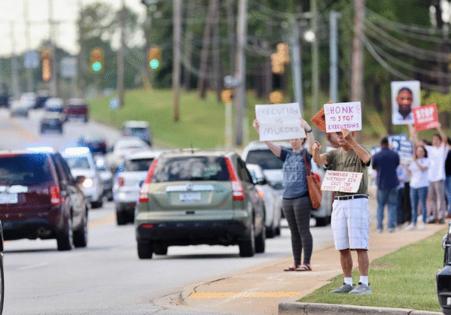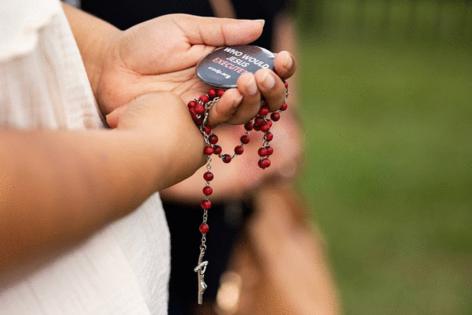South Carolina executes first inmate in 13 years. Freddie Owens dies by lethal injection
Published in News & Features
COLUMBIA, S.C. — Freddie Owens was executed by lethal injection Friday evening for the killing of a Greenville County mother of three, becoming the first first person executed in South Carolina in 13 years.
Owens, 46, was sentenced to death for the murder of Irene Grainger Graves, a 41-year-old store clerk. On Nov. 1, 1997, following a series of robberies, Owens shot and killed Graves while he held up the Speedway gas station where she worked one of her three jobs. At the time, Owens was 19 years old.
Over decades of appeals, Owens maintained his innocence. In the weeks leading up to his execution, his co-defendant, Steven Golden, told courts that he had agreed to testify against Owens after receiving a secret deal from prosecutors. This week, just two days before Owens’ execution, Graves recanted his testimony altogether.
But courts were unmoved.
He was executed after the U.S. Supreme Court and Gov. Henry McMaster issued last-minute statements declining to intervene.
The execution, scheduled for 6 p.m., started 35 minutes late as officials waited on a ruling from the U.S. Supreme Court. It was an unusually long wait, said Jeffrey Collins, a reporter with The Associated Press who has witnessed eight executions in South Carolina.
The execution was witnessed by two members of Graves’ family, Owens’ attorney, a spiritual adviser, an agent from the South Carolina Law Enforcement Division, a representative of the 13th Circuit Solicitor’s Office, an official with the state Department of Corrections, and three members of the media, including Collins. No members of Owens family witnessed the execution.
At 6:35 p.m., with all appeals exhausted and a request for clemency denied by McMaster, media witnesses to the execution said that the dark curtain rose on the death chamber. Behind a window with bars, witnesses say they saw Owens, wearing a green jumpsuit with a white blanket covering his body up to his chest, strapped to a gurney. An IV line ran from a hole in the chamber wall to his left arm.
He turned his head to survey the crowd of witnesses before locking eyes with his attorney, Emily Paavola.
“He was mouthing several words, but you could hear him say, ‘bye,’” said one of the journalists, Justin Dougherty of Fox Carolina News in Greenville. “You could clearly hear him say bye to his attorney. They were making eye contact ... she responded and said bye.”
Owens gave no final statement.
By 6:38, Owens’ eyes closed and his head began to nod, witnesses said. He displayed no signs of discomfort, Collins said, “maybe a small smile.”
Heavy breathing could be heard and he appeared to twitch. By 6:42 p.m., witnesses reported no movement. Witnesses say two members of Graves’ family watched him intently through the glass.
Owens was pronounced dead at 6:55 p.m. by a doctor who checked his pulse and held a stethoscope to his chest.
“The case of the state of South Carolina against Freddie Eugene Owens is now concluded,” said a prison official.
His final meal was two cheeseburgers, fries, a well-done rib-eye steak, six wings, two strawberry sodas and a piece of apple pie.
Owens’ execution was the culmination of a multiyear fight by South Carolina to resume the death penalty after the state ran out of the drugs needed to perform the lethal injection in 2011. In the decade that followed, lawmakers made the electric chair the default execution method and legalized death by firing squad before ultimately passing a so-called “shield law,” hiding all information about the procurement of lethal drugs and the procedures of lethal injection.
An inmate can choose from the three options of execution. Owens asked his attorneys to decide, saying his death would be a suicide if he chose. His attorneys chose lethal injection.
The shield law was designed to circumvent public pressure on drug manufacturers and pharmacies to stop providing drugs for executions. Owens was executed by an injection of a single drug, pentobarbital, a sedative that causes breathing to stop at high doses. It is a relatively new method, adopted by states including Georgia and Arizona as drugs needed in the traditional three-drug lethal injection became harder to secure.
While Collins said that it took roughly twice as long for Owens to stop breathing, as opposed to deaths in past lethal injections that he’d witnessed. Owens’ execution appears to have been carried out with no reported problems despite concerns that a lack of information about the drugs increased the likelihood of a botched execution.
With Owens’ death, the door has been opened. In the coming months, five more men are set to die, with each execution scheduled 35 days apart.
The life of Freddie Owens
Owens’ life was marked by violence: both the violence suffered by him and the violence he inflicted on others.
It swirled around him from before he was born, when his mother was physically assaulted when he was in the womb. As a child, he began skipping school to stay home with his mother after he watched his stepfather chase her with a machete, according to one forensic psychiatrist who testified at his trial.
Throughout his childhood he was in and out of foster care and saw five of his family members sent to prison. One of them was his grandmother, who did prison time after shooting another member of his family.
Owens served time at the Department of Juvenile Justice, where he claimed to have been physically and sexually assaulted, according to court records.
Experts who testified at his trial said that Owens suffered “mild brain dysfunction,” according to court records from one of his appeals. He struggled with a learning disability, impulse control and an antisocial personality disorder. This mutated into a tendency to perceive threats and insults from others and react instinctively with violence, according to experts.
As a young man, Owens turned his rage back against the world.
His goal, he told his girlfriend, was to “go down in history for committing the most murders in Greenville County without getting caught,” according to reporting at the time.
On Halloween night 1997, Owens and three friends embarked on a robbery spree around Greenville. In the early morning hours, armed with guns and with masks covering their faces, Owens and an accomplice, Golden, entered the Starvin’ Marvin Speedway gas station.
Inside, they demanded that Graves open the store’s safe. When she couldn’t, Owens shot her in the head. Their haul was $37.29 taken from the register.
While Golden recanted his testimony two days before Owens’ execution, he declined to name who he now claims was the real shooter. Courts found Golden’s sudden admission unconvincing and the weight of other evidence — from Owens’ participation in the other robberies that night to his admissions to others, including the getaway driver, his girlfriend and his mother — damning.
Seven hours after he was convicted of Graves’ murder in 1999, Owens tortured and murdered his cellmate, Christopher Bryan Lee, a 28-year-old construction worker serving a 90-day jail sentence on a drunken driving charge. In his confession, Owens said that Lee, whose boss was holding his job for him, had taunted him about this conviction.
At a resentencing in 2003, Owens blamed a racist society for his conviction and crimes.
“Believe it or not, I’m your creation,” Owens told the court. “Every white man in here: I’m your creation. You fear me because I’m Black. You fear because you don’t know what to do with me.”
In prison, he converted to Islam and changed his name to Khalil Divine Black Sun Allah, but continued to use the name “Freddie Owens” in his appeals. In 2008, a psychiatrist testified that Owens had taught himself Arabic, Swahili, some French and sign language. He used a book on the life of Alexander the Great to teach other inmates to read.
But he appeared to find little peace. He attacked guards, nurses and inmates, said one prison official. In 2002, he repeatedly stabbed Golden with a homemade “shank” inside of a prison shower, according to court records.
“The death penalty is for the worst of the worst ... and that is Freddie Owens,” said Robert Ariail, the solicitor who prosecuted Owens.
“Freddie is more than his conviction; he is a human being, a son, a brother, and a friend,” his mother, Dora Mason, wrote in a statement Friday. “He deserves compassion, understanding, and a fair chance at justice. Instead, the system has failed him and the victim at every turn.”
_____
©2024 The State. Visit thestate.com. Distributed by Tribune Content Agency, LLC.










Comments